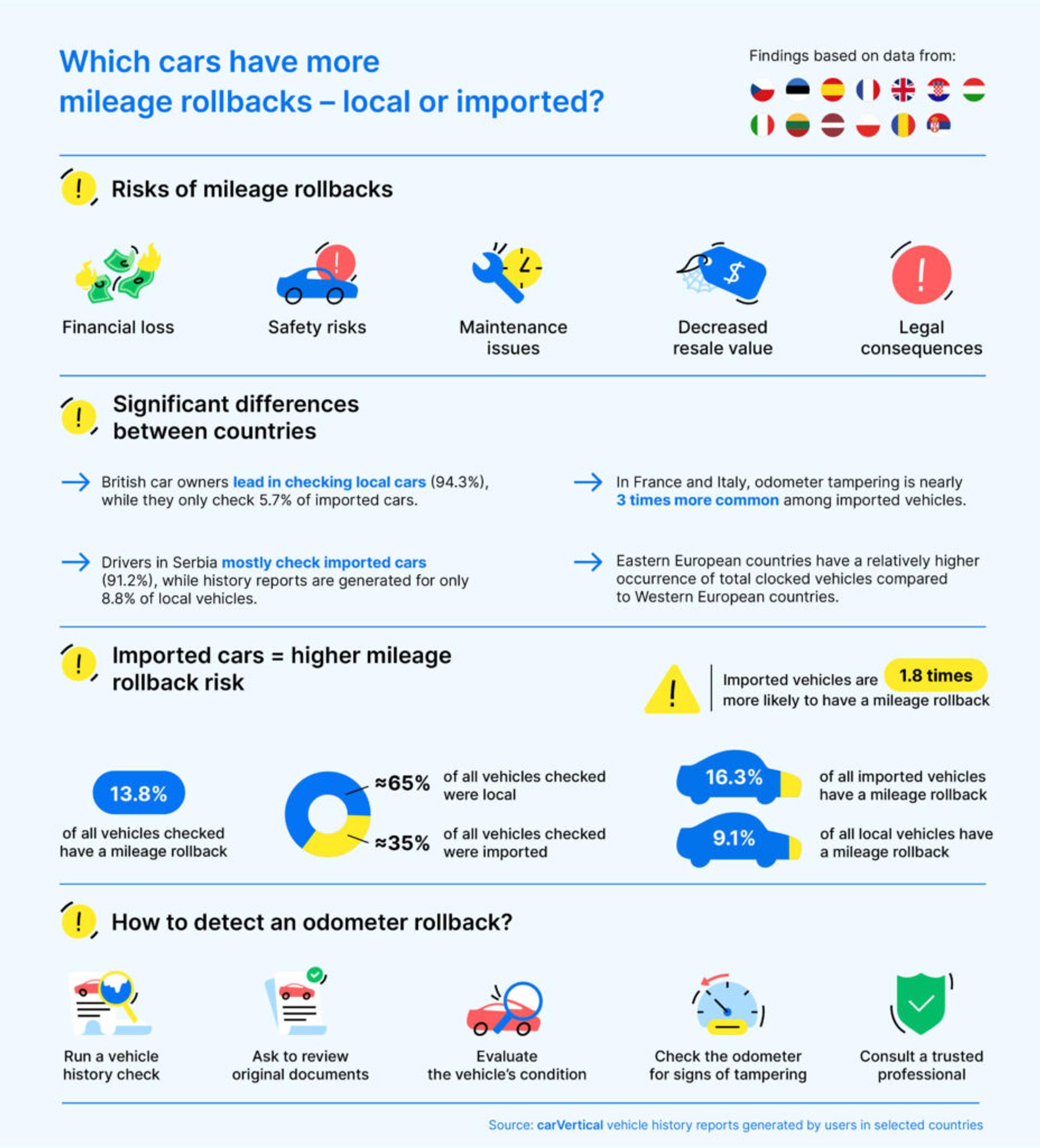18/07/2023
Research: Local or imported cars – which have more mileage rollbacks?

Buying a car can be daunting, and one of the biggest concerns for buyers is odometer fraud, also known as mileage rollbacks or “clocking.” This involves tampering with the vehicle’s odometer to reduce the displayed mileage, making the car appear less used than it actually is.
It’s usually taken for a fact that the risk of getting a clocked car is significantly higher when it’s imported from a foreign country. After all, the cross-border movement of used cars is much more difficult to track.
To check the facts, we analyzed more than 2 million carVertical history reports in 13 European countries – Czechia, Estonia, Spain, France, Great Britain, Croatia, Hungary, Italy, Lithuania, Latvia, Poland, Romania, and Serbia – comparing how car clocking depends on the type of car transaction (imported vs. local).

Try our VIN Decoder!
To learn more about any used car, check its VIN on our VIN Decoder page!
Research findings
Out of all analyzed vehicle history reports, approx. 65% involved imported cars, while the rest were locally purchased vehicles in selected countries. Overall, it was discovered that 13.8% of all cars examined have records indicating mileage rollbacks.
As expected, this deceptive practice is more common among imported cars, which are 1.8 times more likely to have tampered odometers. 16.3% of checked imported vehicles had a mileage rollback, while among the local car owners, the proportion is lower at 9.1%.
Big differences between countries
As it turns out, all analyzed countries face bigger issues with imported vehicles, while odometer tampering occurs less often among local cars. However, there are significant differences.
For instance, in Czechia, odometer tampering is nearly two times more common among imported vehicles. Of all cars checked on carVertical in this country, 13.6% have been found to have tampered odometer readings, while the share of local clocked cars is at 7.1%.
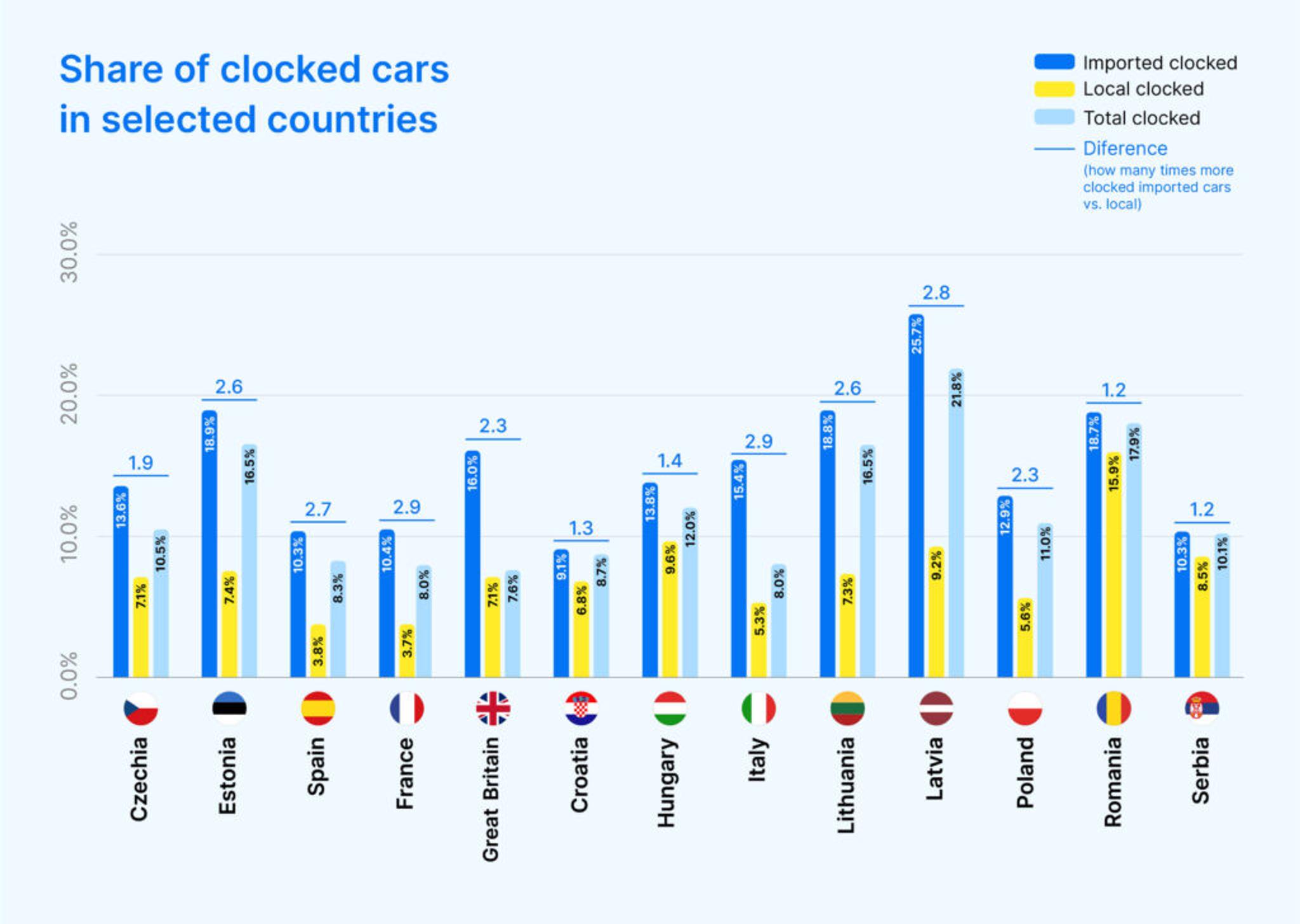
Similarly, imported clocked cars are 2.3 times more prevalent in Poland and Great Britain.
The most significant – 2.9 times – difference between the proportion of imported clocked and local clocked vehicles appears in France and Italy, where out of all imported cars, 10.4% (FR) and 15.4% (IT) have been found to have mileage rollbacks. Meanwhile, “only” 3.7% of local vehicles checked in France and 5.3% of cars analyzed in Italy were clocked.
On the other end of the scale, the difference in prevalence of clocked cars between local and imported vehicles is much less noticeable in Central and South-Eastern Europe. Serbia (1.2 times), Romania (1.2 times) Croatia (1.3 times), and Czechia (1.9 times) have a similar proportion of local and imported clocked cars.
Eastern Europe faces the biggest issues with clocked cars
Latvia (21.8%), Romania (17.9%), Estonia (16.5%), and Lithuania (16.5%) “lead” the pack with the highest number of total clocked cars. Meanwhile Great Britain (7.6%), France (8%), Italy (8%), and Spain (8.3%) have the lowest proportion of local and imported vehicles with tampered odometer readings.
When comparing the total number of clocked cars in Western European countries, you can see that the scale of the issue in each country is quite similar. The percentage of total clocked vehicles varies from 7.6% to 8.3% in the countries with the best (lowest number of clocked cars) results.
Results of the top four Eastern European countries with the most clocked cars range from 16.5% to 21.8% – almost three times more than the best result among Western European countries.
Significantly more local cars found in Western Europe
While all countries have significant numbers of both imported and local vehicles (with the exception of the UK), Western countries tend to have more local cars.
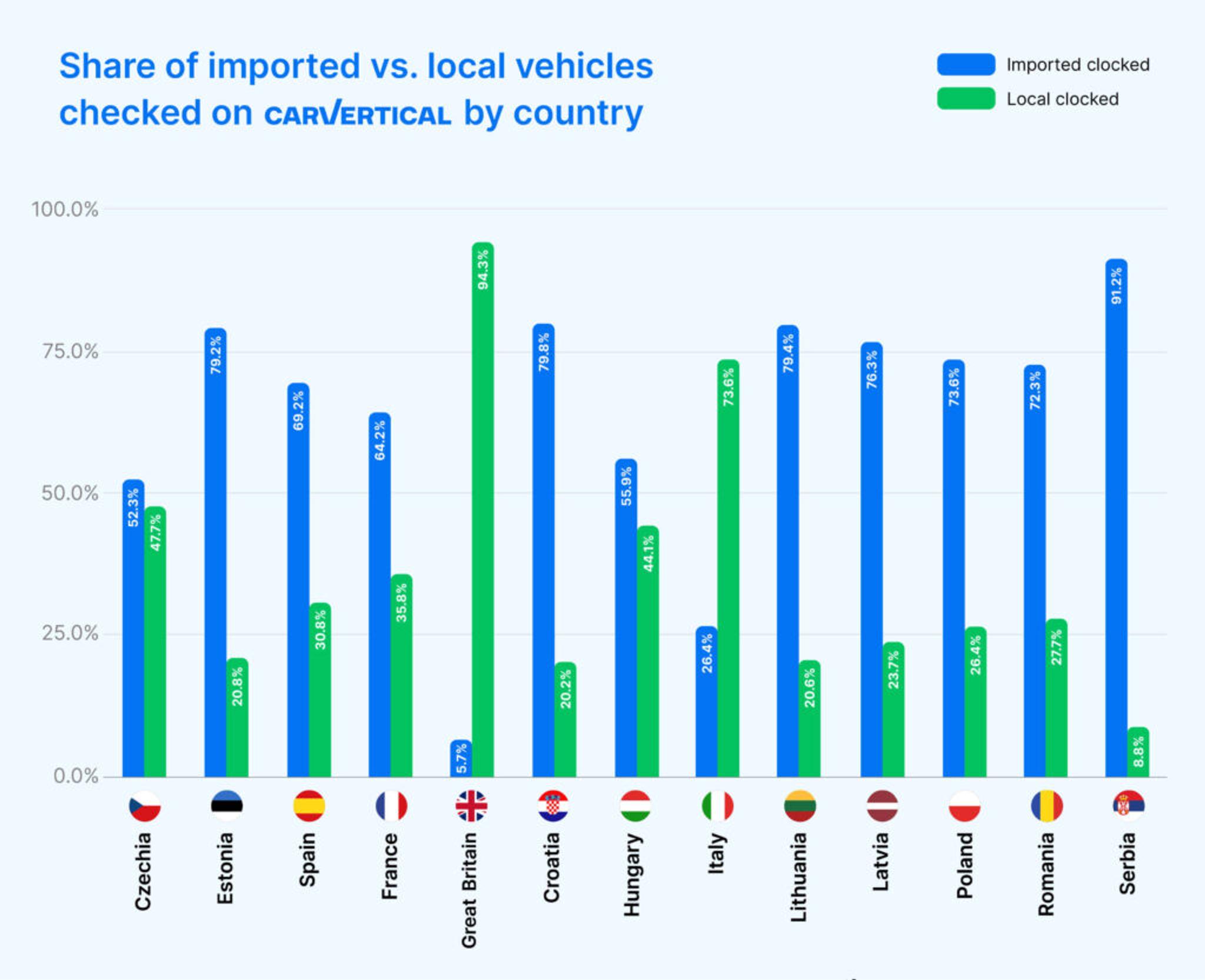
For example, out of all checked vehicles in Great Britain, a whopping 94.3% were local (due to the traffic direction differences). The situation is similar in Italy, with 73.6% of local cars and 26.4% imported ones. 15.4% of imported cars checked in Italy had tampered odometers, while the percentage of local clocked cars was nearly three times lower – 5.3%.
Most Central/Eastern European countries have a significantly higher number of imported cars, which accounts for the much higher percentage of clocked cars overall.
Generally, the countries we checked have more imported cars (approx. 65%), demonstrating the prevalence of cross-border trades in Europe.
Hypothesis and methodology
Cross-border car transactions are supposed to be considerably more risky because countries don’t exchange car transaction details. For instance, if a car is sold in Germany, German authorities will not provide any information about the mileage to other EU member states’ car registration authorities.
As a result, fraudsters take this as an opportunity to modify car mileage, seeking to sell for more than the actual worth. This is a huge pain point in Europe or any region where cross-border car movement makes up a significant share of car transactions.
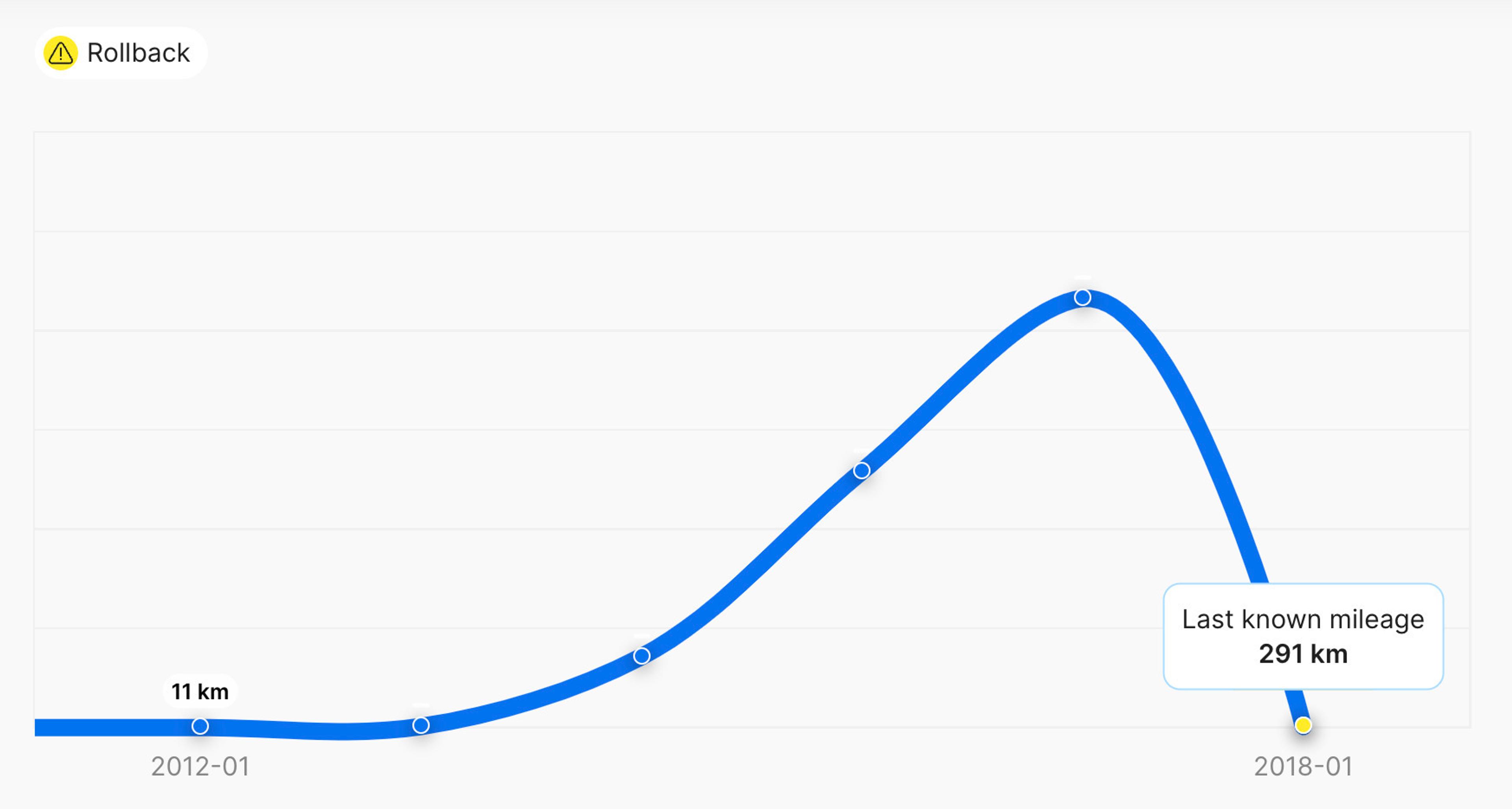
To compare the prevalence of mileage rollbacks in vehicles, we did a research in 13 European countries – Czechia, Estonia, Spain, France, Great Britain, Croatia, Hungary, Italy, Lithuania, Latvia, Poland, Romania, and Serbia.
The findings are based on data from carVertical vehicle history reports generated by our users, which we divided into two groups:
- Local vehicles: Local vehicles are those with data records found in only one country (ignoring records designating the country of manufacture).
- Imported vehicles: Imported vehicles have data records in more than one country.
The data allows us to determine what percentage of these local and imported vehicles have a mileage rollback, and to calculate the number of clocked cars in selected European countries.
A vehicle with a tampered odometer can lead to financial disaster
Buying a vehicle with tampered odometer always leads to overpaying for the car itself and holds a possibility of facing big losses in the future.
Clocked vehicles have more wear and tear than you would expect, and they’re also more difficult to sell.
There’s also a risk that the vehicle with a rolled-back odometer may not have received necessary maintenance, as these events are often provided based on mileage intervals (e.g., changing a timing belt).
Driving a car in worse condition than it appears can also raise some serious safety concerns.
How carVertical can help you avoid mileage rollbacks
With all of the above combined, it’s safe to say that checking a car’s history becomes a critical pillar in the whole used car buying process.
Our reports provide valuable information about a vehicle’s past, including the mileage history. This will help you avoid clocked cars on the market.
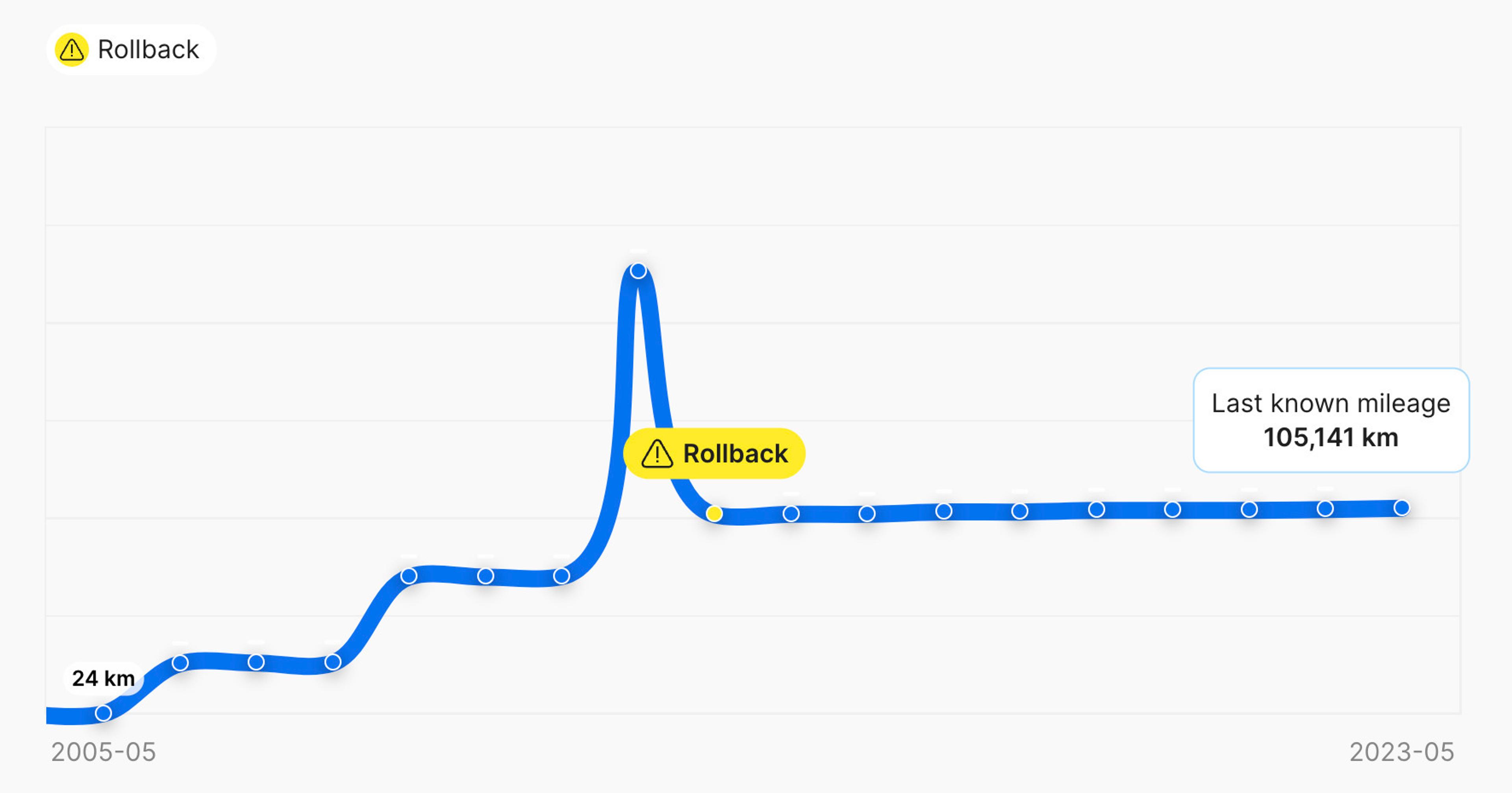

Check your VIN
Avoid costly problems by checking a vehicle's history. Get a report instantly!
To get a carVertical report, all you need is the vehicle's VIN number. The dashboard is the most common place for the VIN (visible through the windshield on the driver’s side of the car), but you can also find it on the driver’s side door jamb, under the hood, or check the vehicle’s documentation.
Many used car ads will also include the VIN, and you can always ask the seller directly.
In addition to mileage rollbacks, our reports will also help you learn about past damages, ownership changes, theft reports (if any), and more.
